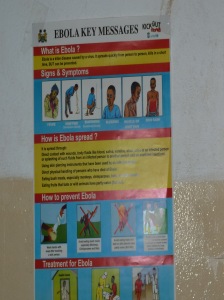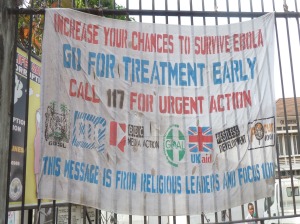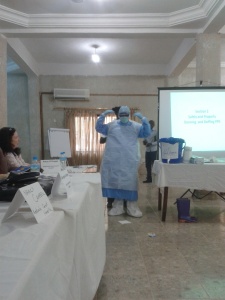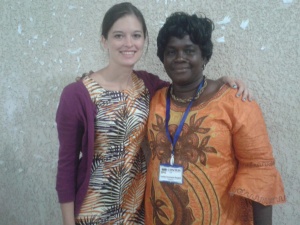I am now in my final few days in Sierra Leone, beginning to pack up and make that mental and emotional transfer that always slightly pre-empts the physical transfer. The beginnings of the excitement about seeing the people I have missed, eating the foods I have craved, and other aspects of life at home. And also a creeping sadness as the realisation grows that my time here is coming to an end.
I feel incredibly lucky to have been able to come out to Sierra Leone this time. When my initial plans to come out to Sierra Leone for 6 weeks to work in an Ebola treatment centre fell through, I was very disappointed. I had been so looking forward to being back here, and hoping that I would be able to make some kind of contribution to this country that I fell in love with last year, during this particularly difficult time. But as with any disappointment, what I had not counted on was the incredible opportunity it gave me, by allowing me to apply and be given this short term position with Welbodi.
It has been a fascinating time to be in Sierra Leone, for many of the reasons I have blogged about before. Probably the most interesting for me has been witnessing the beginnings of a transition phase of emergency aid and humanitarian work towards thinking about the longer term. At all levels, people are thinking and talking about this transition – at the government and ministry levels, in NGOs of all sizes, and at a local community level too. The “what happens now?” question. Organisations and groups that were active here before the outbreak beginning to go back to their routine activities, and examining whether they are what they still want to be doing; and organisations that have come to Sierra Leone for the first time, as many have, wondering if they might still have a role to play over the coming months and years.
I have to admit that it makes me feel slightly anxious, thinking about this transition. There is so much energy and momentum, and yes, money, coming into the country at the moment, and there are many organisations that only started forming their relationships with Sierra Leone during this crisis period that I am nervous that there might be a bit of a bulldozer mentality in some places: we’re here now, let’s start some projects- without real involvement and participation of the existing structures such as the District Health Management Teams. It comes from a good place, people wanting to help, and hopefully my anxieties are unfounded, but I do worry about the risk of bitty, uncoordinated and top-down approaches developing, which could have the potential do more harm than good. There is the potential to do a lot of good as well though, and to help this country build itself a stronger health system, and maybe it is the risk of some of this potential being wasted that makes me feel anxious about it.
For me, working with Welbodi has been very rewarding. It is an organisation that not only states intentions of capacity building with a participatory approach, but practices it too, and has been an inspiration to me about how long term health development work can and should be achieved. By establishing a long-term relationship with a government hospital and helping them to achieve their own goals of development with expertise, funding and support, the changes that are made are sustainable and meaningful.
So in all, I have been very lucky to have this opportunity, and it has allowed me to fall even further in love with this country. Leaving on Sunday morning, I know that my heart will be heavy, but I also know that I will not be saying goodbye to Sweet Salone, but just “until the next time”.



